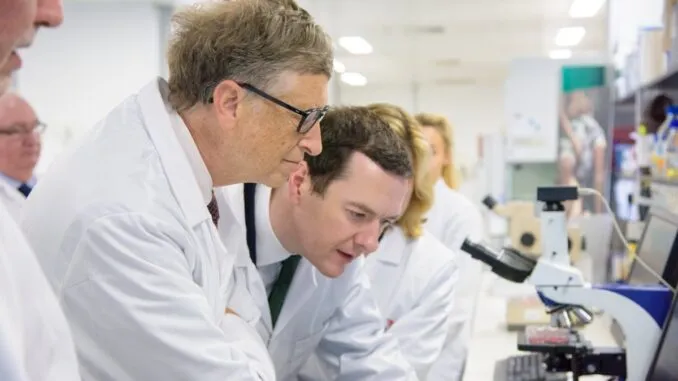Bill Gates Lab Is Creating a Version of Monkeypox ‘1,000 Times More Lethal Than Normal’
A Bill Gates-affiliated laboratory is creating a synthetic version of monkeypox that is 1,000 times more lethal than the natural version.
House Energy and Commerce Committee Chair Cathy McMorris Rodgers (R-WA), Subcommittee on Health Chair Brett Guthrie (R-KY), and Subcommittee on Oversight and Investigations Chair Morgan Griffith (R-VA) today sent a letter to Lawrence Tabak, the senior official performing the duties of director at the NIH, regarding details about a dangerous supercharged monkeypox experiment planned by an NIH and Gates-funded researcher.
Strangesounds.org reports: The letter follows up on an October 31, 2022, letter, which the NIH has not provided a formal response. It also contains a formal notice to preserve all existing and future records and materials related to the topic.
The project in question involves transferring genes from “clade 1” or Congo Basin clade monkeypox virus (a rare version of monkeypox virus that is 1,000 times more lethal in mice than the version currently circulating in humans) into “clade 2” or West African clade monkeypox virus (the version currently circulating in humans). The clade 1 version of the monkeypox virus is so dangerous that it is classified as a Federal Select Agent. Information about the specific experiments became known when the researcher discussed his plans in a September 2022 Science article on National Institute of Allergy and Infectious Diseases (NIAID) work on monkeypox.
KEY EXCERPT:
“Based on the available information, it appears the project is reasonably anticipated to yield a lab-generated monkeypox virus that is 1,000 times more lethal in mice than the monkeypox virus currently circulating in humans and that transmits as efficiently as the monkeypox virus currently circulating in humans. The risk-benefit ratio indicates potentially serious risks without clear civilian practical applications. Accordingly, this experiment would seem to involve risks reasonably anticipated to create, transfer, or use PPPs resulting from the enhancement of a pathogen’s transmissibility or virulence in humans. Thus, under the circumstances, we are interested in learning whether this experiment was reviewed under the HHS P3CO framework used to review research proposals posing significant biosafety or biosecurity risks.
“Further, human disease associated with clade 2 or West African monkeypox virus infection is less severe and is associated with less than one percent mortality, whereas clade 1 or Congo Basin monkeypox infection has a 10 percent case fatality rate in unvaccinated persons. Because of its significantly greater lethality, clade 1 or Congo Basin clade monkeypox viruses are regulated as select agents by the Federal Select Agents Program. Entities that possess, use, or transfer this agent must comply with the HHS Select Agent and Toxin Regulations unless there is an applicable exemption or exclusion. Thus, under these regulations, it would appear the clade 1 monkeypox virus experiment is a restricted experiment that must be reviewed by the Federal Select Agent Program, and may be further reviewed by the Centers for Disease Control and Prevention‘s (CDC’s) Intragovernmental Select Agents and Toxins Technical Advisory Committee (ISATTAC).”
In light of these concerns over the adequacy of NIH’s oversight of research posing a significant risk of biosafety and biosecurity risks, and involving a federal select agent, the Chairs requested a formal response by April 13, 2023.
CLICK HERE to read the full letter… via House.gov
Source: News Punch





